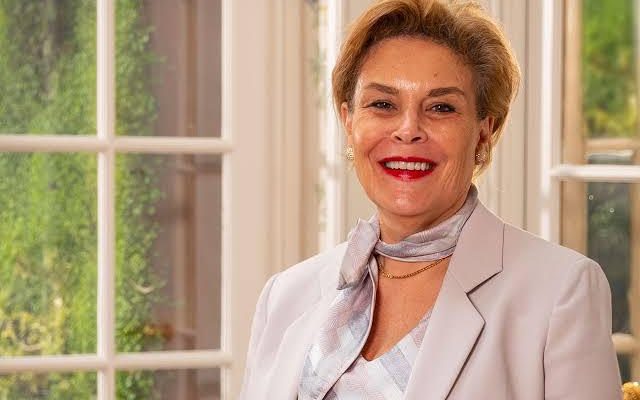Ramsco chief pursues dream of climate-smart agriculture in Egypt
Source : the national news- Home
- Ramsco chief pursues dream of climate-smart agriculture in Egypt

About 15 years ago, two events changed the course of Rawya Mansour’s career: observing the poverty in Egypt’s rural areas and attending an environmental conference in Vienna.
Both led her to focus on poverty eradication, food security, climate change mitigation and women's empowerment.
“I was previously an interior designer and I was working very much for the rich,” Ms Mansour, chief executive of Ramsco Trade and Distribution, told The National.
“But I thought God created me for a better cause and this is why I’m doing what I’m doing. It’s my passion.”
Through her company, Ms Mansour uses biochar machines and biofertilisers in contract farming to recycle agricultural waste, save water, increase yield and withdraw carbon.
“I do it from the point where I love my country … I’m doing it to have food security and to stop polluting the air” Rawya Mansour
The interlinked challenges of food security and climate change are very much in the spotlight, as Egypt prepares to host the UN climate summit Cop27 between Nov 6 and 18.
About 924 million people faced severe food insecurity 2021, an increase of 207 million in two years, a 2022 UN report showed.
At the same time, agriculture is a major part of the climate problem, accounting for about 40 per cent of methane emissions from human activity, the World Bank says. That includes rice cultivation and agriculture waste burning, manure management, and gas emitted by cows and sheep.
Ms Mansour comes from a completely different background than agriculture, having studied commerce and law at Cairo University, and in 1999, creating Ramsco for Refined Architecture and Interior Design.
She is also part owner of family-owned conglomerate Mansour Group, which was left to her and her four brothers — Ismail, Youssef, Mohamed and Yasseen — following the death of her father Loutfy in 1976.
What started as a cotton-exporting business in 1952 is now a company spanning many sectors, including automotive, machinery and equipment, consumer goods, financial investments and real estate.
Today, the Mansour Group has more than 60,000 employees, a presence in more than 100 countries and total revenue exceeding $7.5 billion. It is one of the largest General Motors dealers in the world and a top franchisee or distributor for other leading brands, such as Peugeot, MG, Caterpillar, McDonald’s and Philip Morris.
However, Ms Mansour has had little to do with the family business, leaving the management to brothers Mohamed, Youssef and Yasseen.
She has forged her own path and established Ramsco Trade and Distribution in 2007 with the idea of turning Egypt’s agriwaste into renewable energy and fertilisers.
Working with scientists in the field and using land at the Egyptian Research Centre, the company started inventing its own biochar machines and soil enhancers.
“It was like my own research centre, with trial and error,” Ms Mansour said.
Biochar machines convert agricultural waste, such as rice straw, into biochar, a form of charcoal that can be used as a fertiliser and for carbon capture. The material is produced through pyrolysis, a process of slowly burning biomass in a low-oxygen chamber.
“For every tonne that you put back in the soil, it takes 2.5 tonnes of carbon out of the air and at the same time, it lessens the usage of water,” she explained.
In 2009, Ms Mansour founded Ramsco for Sustainable Agricultural Development to put such methods to use in contract farms.
The use of biochar and drip irrigation saves up to 65 per cent of water and increases yield by 30 per cent, the company said.
Over 13 acres of farm land in Ismailia, north-east of Cairo, Ms Mansour employs 24 farmers and grows about 30 types of vegetable cash crops that are sold in high-end supermarkets under the name Ramsco Organic.
To empower women, she instated a company policy of equal salaries for men and women farmers and gave them health insurance benefits.
“It’s not charity,” Ms Mansour was quick to say. However, it does take a high upfront investment and her business is not yet profitable.
“I do it from the point where I love my country … I’m doing it to have food security and to stop polluting the air,” Rawya Mansour
Ms Mansour has worked to secure patents for her biochar machines and organic fertilisers through another company she established in Monaco in 2012, Organic Agriculture for Social International Solidarity (Oasis).
“People look at my company in Egypt as a vegetable project, but actually, I have intellectual properties and technologies registered in Monaco and in many other countries,” she said.
Ms Mansour was honoured by UK-based African Leadership Magazine as an African female leader of the year in 2019 and was named among the continent's 50 most powerful women by Forbes Africa in 2020.
She is also a member of the Arab Businesswomen Council, the Clinton Global Initiative, the Earth Institute at Columbia University and the UN Development Programme’s Information and Decision Support Centre.
However, what Ms Mansour really has her sights on is creating ecovillages with zero waste throughout North Africa and the Middle East.
“Definitely, with my small amount of land, I cannot help the world,” she said.
“But if this project is done on a much bigger scale, where it will be ecovillages for millions of acres, then you can mitigate and adapt to climate change and fulfil almost all the objectives of the UN for 2030.”

